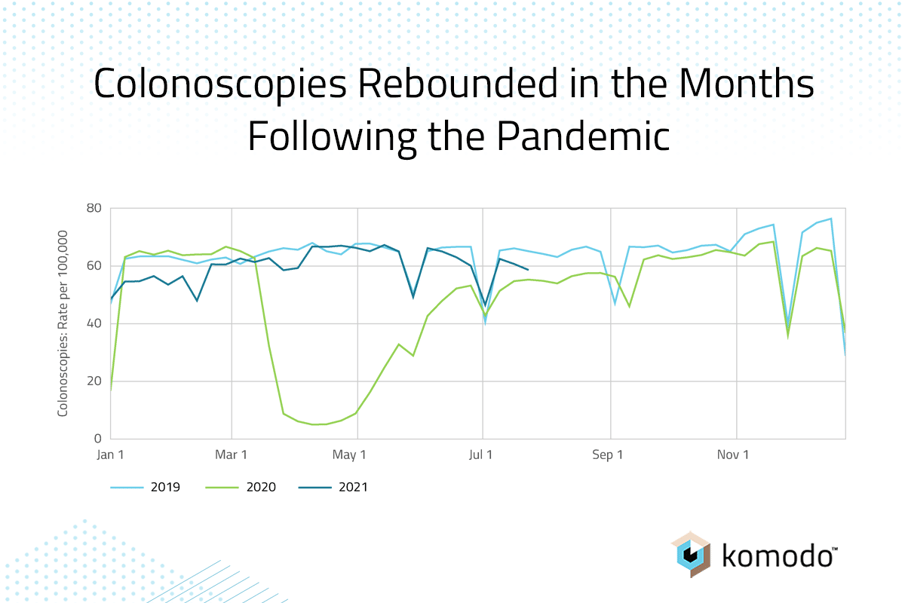Screening and Treatments for Colorectal Cancer Have Nearly Bounced Back to Pre-Pandemic Numbers, but Have Yet to Make Up for Lost Time

At the end of 2020, we published a report in partnership with Fight CRC highlighting the declines in colorectal cancer (CRC) screenings and diagnoses at the beginning of the COVID-19 pandemic. In that analysis, we found that the total number of colonoscopies and biopsies declined nearly 90% in April 2020 compared to the same period of 2019. New CRC diagnoses were down more than 32%, and colorectal cancer surgeries fell by 53% compared to the baseline.
Given that CRC is one of the top three most deadly cancers in the United States, we had hoped to see a swift rebound in screenings. CRC is typically diagnosed after the onset of symptoms, or through a colonoscopy screening, which makes it crucial to understand red-flag symptoms and uphold screening protocols whenever possible – particularly for individuals who may be at an increased risk.
Using Komodo Health’s Healthcare Map™, we’ve now expanded on that analysis to track developments throughout the 16 months following the pandemic’s onset – from March 2020 until July 2021.
Screenings, new diagnoses, and surgeries dipped to their lowest point in April 2020.
Compared to the same period in 2019, by mid-April 2020, colonoscopy screenings had declined by 92%, biopsies had declined by 92%, new diagnoses by 50%, and colorectal cancer surgeries by 55%.
Colonoscopies rebounded in the months following the pandemic and rates had nearly caught up to pre-pandemic levels by fall of 2020. Other procedures returned to nearly pre-pandemic levels by mid-September of 2020, where they remain.
Continuing through spring 2021, levels of colonoscopies mirrored the 2019 baseline. While we might have expected to see a surge in visits making up the 2020 lag, there was no major influx in rescheduled visits to compensate for the drop in care. The number of monthly visits in 2021 hovered just below 2019 levels, exceeding those only for a few, brief periods. By mid-September of 2020, colonoscopy screenings remained 6% less, biopsies 5% less, new diagnoses 5% less, and colorectal cancer surgeries 4% less than they were in mid-September 2019, prior to the pandemic.

Amid an increase in early-onset colorectal cancer, red-flag symptoms continue to differ in younger age groups.
Thanks largely to public health awareness efforts, screenings, and improved technology and treatment options, overall CRC mortality rates have improved substantially in the past few decades. However, there has been a concerning increase in CRC diagnosis and mortality among younger patient populations, before most individuals have reached the age when colonoscopy screening would be considered standard.
To continue to shed light on opportunities for earlier diagnosis, we reexamined research questions from a 2021 analysis of symptom presentation by age group. We found that younger CRC patients presented with pain in the lower right abdominal quadrant much more frequently (14.22%) than those in the 35–49 or 50+ cohorts (10.15% and 5.60%, respectively). This suggests these patients may be experiencing more irritation in the descending colon specifically – an issue that can present as nonspecific, making it more difficult for physicians to understand and link to a CRC diagnosis.
Gastroenterologists became more important for diagnosing red-flag symptoms in young people during the pandemic.
For people ages 35 and under, emergency departments remained the most common place for patients to initially present with symptoms prior to their CRC diagnosis (29%). The most common symptom leading to this first encounter was unspecified abdominal pain. Interestingly, gastroenterologists became increasingly important for younger patients during the pandemic, as these physicians became the second most common specialty to diagnose red-flag symptoms, where previously it was internal medicine specialists. This may be due to less utilization of emergency departments during the pandemic, leading people to rely on telemedicine and other medical specialties to address nonurgent health concerns. Gastroenterologists remained the physicians to identify red-flag symptoms most frequently in patients aged 35–49 (37% of patients) and 50 or older (40% of patients).
This analysis strengthens the body of evidence that the long-term health impacts of the pandemic are still unfolding. While rates of CRC diagnosis and death are declining overall in the U.S., this decline has slowed since 2013, and the rates are increasing by about 2% per year in adults under 50. Screening is the most important tool in preventing morbidity and mortality from CRC. In a disease where early diagnosis can be lifesaving, more work can – and must – be done to invest in colonoscopy screenings as well as noninvasive screening tests to enhance earlier diagnosis and treatment for colorectal cancer.
In our goal to lessen the burden of disease, Komodo Health is working to identify obscured trends in symptom presentation and course of disease to arm providers, policymakers, and the public alike with the most accurate, age-specific, and actionable information.
Read about Komodo Health and BLKHLTH’s  on how late diagnosis and delayed treatments result in worse outcomes for Black CRC patients.
on how late diagnosis and delayed treatments result in worse outcomes for Black CRC patients.
To see more articles like this, follow Komodo Health on Twitter and LinkedIn, and visit Insights on our website.






